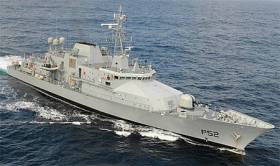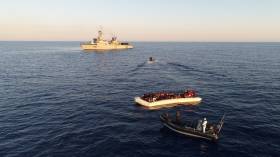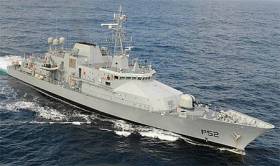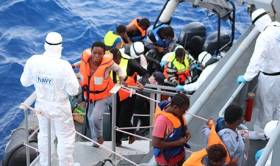Displaying items by tag: Med Migrant Crisis
Irish Naval Service Pair to Join Mediterranean Migrant Rescue
#Navy - It is expected the Government is to announce next Tuesday to agree to send two Naval Service ships to the Mediterranean in an effort to help the European Union’s mission to rescue migrants and reduce people-smuggling .
If the Cabinet memo from Minister of State for Defence Paul Kehoe is approved, writes The Irish Times, two Irish Naval ships will spend two separate, consecutive 16-week missions between Italy and Libya from April until year’s end.
The operation in the Mediterranean – Operation Sophia – began in April 2015. Known formally as the European Union Naval Force Mediterranean, it sought to disrupt Libyan-based people-smugglers.
Following the drownings of hundreds of refugee migrants after the sinking of unseaworthy boats and ribs, the mission’s scope was extended, including the rescue of migrants.
For further reading, click the link here.
Naval Service Rescues Over 180 Refugees in the Mediterranean
#Refugees - LÉ Eithne of the Irish Naval Service writes the Journal.ie has rescued approximately 183 people yesterday (25 June) in the Mediterranean Sea, just north of the Libyan capital Tripoli.
While on patrol at around 6 am, the LÉ Eithne located and rescued 113 refugees from an inflatable craft 40km north-west of Tripoli.
The crew on the ship then identified another craft in distress, and a second rescue operation was launched.
A further 70 people were rescued from this boat.
There are currently 183 on board the LÉ Eithne and the Irish vessel is enroute to assist in another rescue operation in the region.
#DeploymentDelays - Tensions between a Naval Service patrol ship and the Italian coastguard writes The Irish Times, have emerged during a trial of three Libyan men accused of people trafficking in the Mediterranean.
The exchanges have led to a call for “clarity” from Government for future Irish rescue missions.
The European Network Against Racism (ENAR) Ireland called on the Minister for Defence to “provide the Naval Service with the operational clarity it needs to carry out rescue missions swiftly and without hesitation”.
The Naval Service has so far saved 15,621 lives since deployment of ships to the Mediterranean in May 2015 under a bilateral arrangement with Italy.
As previously reported on Afloat, LÉ Eithne was ready to return to the Mediterranean on May 1st this year, is awaiting Government approval to sail south.
For more on this story, click here.
LÉ Róisín Rescues Migrants And Recovers Two Bodies
#Rescue&Recovery - OPV LÉ Róisín has carried out a search and rescue (SAR) that located 111 migrants from a long rubber vessel almost 40nm north-west off Tripoli, the Libyan capital. Unfortunately, two deceased female migrants were recovered as part of a request from the Italian Maritime Rescue Co-ordination Centre.
The Naval Service rescue commenced at 06.50am and all migrants were on board by 09.40am and have received food, water and medical treatment where required.
The LÉ Róisín proceeded towards the Port of Lampedusa for the transfer of migrants to the Italian authorities.
Not including this latest task, LÉ Róisín has rescued 782 people since the OPV was deployed on SAR operations on 11 May.
































































